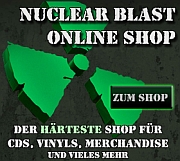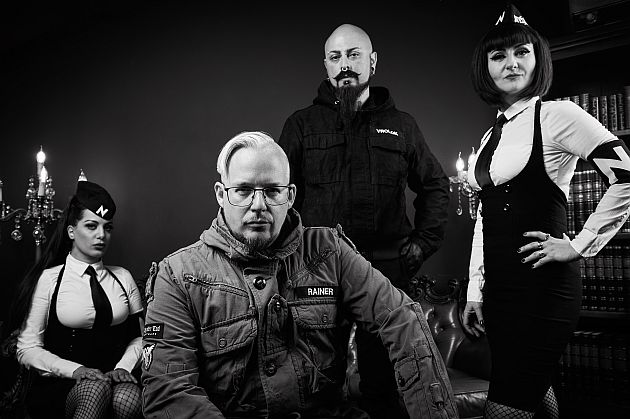 Interview with
Interview withThomas Rainer (music, vocals) and Kateryna Gubanova (performance / keys) from Nachtmahr
NACHTMAHR, the brainchild of Thomas Rainer, has been a provocative force in the Industrial and Electronic music scenes since its inception. Known for its unapologetically aggressive sound and controversial visual aesthetics, the project has consistently pushed the boundaries of both music and art.
Formed in 2007, NACHTMAHR quickly gained attention with its debut album ‘Feuer Frei!’ and has since released a series of albums that explore dark, provocative themes, often drawing from historical and cultural references. The band’s use of militaristic imagery and bold, confrontational visuals has sparked significant controversy, raising questions about the fine line between art and real-world symbols of power. Despite this, NACHTMAHR has maintained a strong following, known for its intense live performances and a commitment to challenging norms. In the interview for Reflections of Darkness Thomas Rainer discusses the evolution of NACHTMAHR’s sound, the inspirations behind the latest albums ‘Flamme’ and ‘Stellungskrieg,’ and the band’s approach to blending art and controversy. He also addresses the criticism surrounding NACHTMAHR’s use of militaristic imagery and the balance between provocation and responsibility in their work.
Reflections of Darkness [RoD]: Since ‘Feuer Frei!’, NACHTMAHR’s sound has evolved significantly. How would you describe the progression of your music from your early albums to your more recent releases like ‘Stellungskrieg’? What elements have remained consistent, and how have you pushed the boundaries of your sound?
Thomas: The main change in my approach is that in the beginning, I was more careful staying within the boundaries of the genre, and now over time, I don’t care anymore. Every song gets the treatment it, and its lyrics deserve, regardless of the tight corset of the Electro / Industrial scene. The success of NACHTMAHR gave me the self-esteem to break free and let the music evolve without restraint.
RoD: Your latest albums, ‘Flamme’ and ‘Stellungskrieg’, have a distinctive sound compared to your earlier work. What were the primary musical and thematic inspirations behind these albums? Did you experiment with any new production techniques or approaches during the recording process?
Thomas: ‘Flamme’ was made as a middle finger to all “mouse-musicians” in this scene to make a statement that our songs can stand their ground as acoustic versions, both on the album as well as at the guerrilla shows we have done with acoustic guitar, piano, and vocals. Yes, we are real musicians who don’t need to hide behind electronics. The main new element of ‘Stellungskrieg’ was the addition of guitars, whose influence is even stronger on our new album ‘Verboten!’ that will be out Nov 1st.
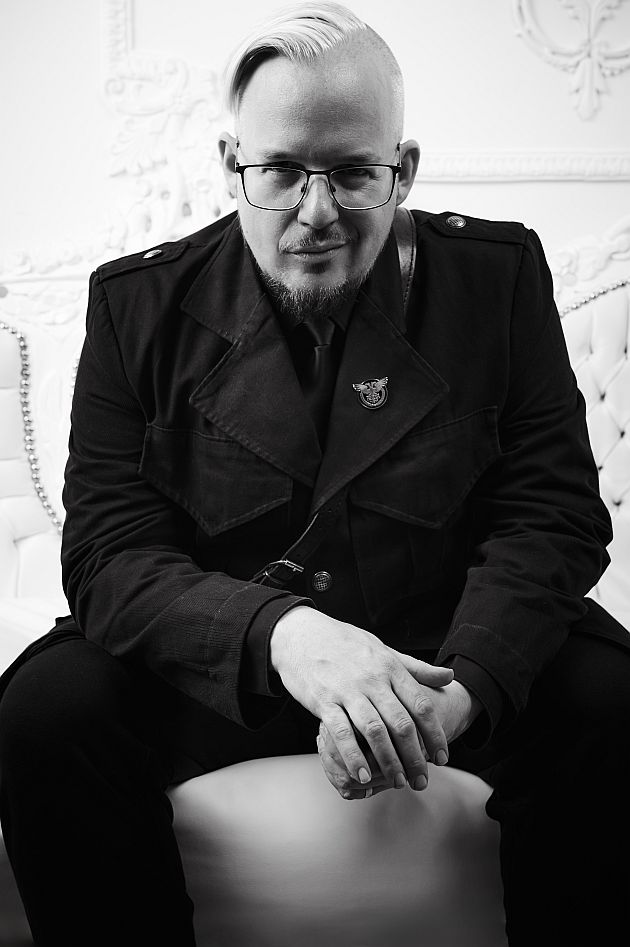
RoD: NACHTMAHR blends traditional EBM with modern electronic elements. How do you stay connected to contemporary electronic music trends, and have any recent artists or genres influenced your recent work?
Thomas: Working as a DJ in clubs around the globe, I get a lot of influences from the stuff other DJs play. I always listen closely and take notes, and some of these songs also influence my writing.
RoD: Your lyrics often delve into dark and provocative themes, from power dynamics to personal and societal struggles. How do you balance the need to create accessible music with the desire to explore complex and sometimes uncomfortable subject matter?
Thomas: A lot of people listening to this kind of music sadly don’t care that much about lyrics, but I think I was able to educate the NACHTMAHR fans correctly. Lyrics and music are equally important in my work and are key to understanding what the band and its presentation are all about.
RoD: Many of your works, such as ‘Veni Vidi Vici’ and ‘Kampfbereit’, seem to draw from historical and cultural references. How do these influences shape your music and visuals, especially in your recent releases?
Thomas: Art is all around us and provides great inspiration for one’s approach on how to express oneself. These can range from Roman proverbs (Veni Vidi Vici) to communist propaganda posters (Kampfbereit) to religion (Lucifer) and even Mexican mythology (El Chupacabra).
RoD: NACHTMAHR is known for its powerful and sometimes controversial visual aesthetics. How do you ensure that your visual presentation complements and enhances your music? Do you draw inspiration from specific visual artists or movements when crafting your stage presence and music videos?
Thomas: The initial idea of using a military image was its aura of power and authority, which I believe perfectly fits the hard electronic style and shouted vocals of the music. Inspirations were manifold, and the first uniforms used on stage were Austrian camouflage from the 1970s.
RoD: Your use of militaristic imagery has sparked considerable controversy. How do you respond to critics who claim that your work glorifies authoritarianism or flirts with fascist aesthetics? Do you feel a responsibility in how these images are interpreted by your audience?
Thomas: I can agree that NACHTMAHR draws some influence from styles used by authoritarian regimes from all over the world, but it is certainly not limited to those. We used uniforms from Austria, Germany, the UK, and Russia in the past, as well as several modern military or military-style clothes from high fashion brands. Our responsibility goes only as far as providing the right context for the imagery with our lyrics and music. A lot of songs are highly critical of authority, war, and the state the current world is in and should leave close to no room for misinterpretation. If people disconnect images from their context, this responsibility is lifted, as it would be a Herculean task to create art that is impossible to be misinterpreted out of its context. Furthermore, we completely stay away from political commentary of any kind to avoid being ‘taken over’ by any side of it. If action is needed, we do take it swiftly, e.g., our cancellation of our concert at Black Mountain Festival as soon as rumours came to light that the promoter was publicly endorsing the German AfD (comment: right-wing nationalist party) through the event’s official channels.
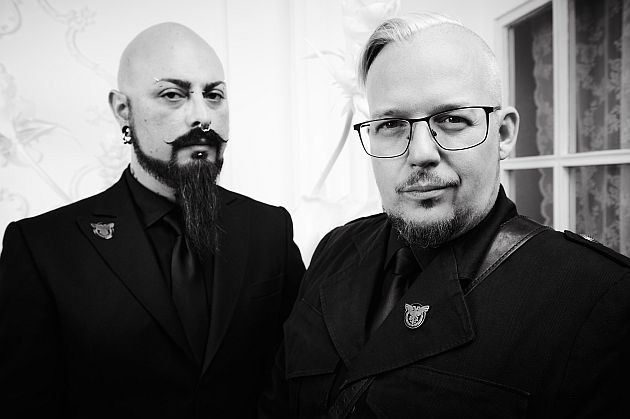
RoD: Provocation is one of the key elements of NACHTMAHR’s identity. What do you see as the purpose of provocation in your art? Are there boundaries you won’t cross, or do you believe that everything is fair game in the name of artistic expression?
Thomas: Provocation is an inherent characteristic of a lot of art, as it can draw the attention of people towards what you wanted or even need to express, starting a communicative process with them. One of the main lines I don’t want to cross is any kind of political endorsement, as one’s fans could be influenced by this and make it their own opinion in an un-reflected way. The ‘power’ I have is granted to me by my fans and supporters, and it is my holy duty not to abuse it in any way, especially not to further a private or political agenda. Most other lines should be pretty clearly set by the laws of my country.
RoD: Some of your visual aesthetics, particularly involving women in uniforms or submissive roles, have been criticized as objectifying. How do you reconcile your artistic vision with concerns about perpetuating harmful gender stereotypes?
Thomas: I’ll let Kateryna Gubanova (performance / keys) answer this, as it is usually better to let women answer questions about women.
Kateryna: Our artistic vision as a band is rooted in creative expression and exploring fantasies and aesthetics that resonate with us as individuals. While I respect that our visual presentation has generated some critical discussions around gender portrayals, I think it's important to clarify a few points. Firstly, the women in our band, myself included, are not just submissive figures on stage - we are active participants and musicians. I am a keyboardist, and my role is not simply decorative. When we perform, we express ourselves in ways that feel natural and authentic to us. We make our own choices about how we present ourselves, informed by our artistic sensibilities and what we find empowering.
If our aesthetics sometimes play with provocative or transgressive imagery, it comes from a place of personal agency, not an intention to promote any stereotypes. We are not asking other women to conform to a certain behaviour or image. Quite the opposite - we hope to inspire them to define and express their individuality, whatever that means for them. Art can be a space to challenge norms and ask bold questions. While I don't believe our performances inherently objectify women, I understand the concerns and welcome the dialogue. These are complex issues, and I'm glad they are part of the cultural conversation. As artists, we have a responsibility to be thoughtful about our impact. Ultimately, our band is about the music we create and the personal creative fulfilment we get from performing together. We will continue to be true to our artistic core while striving to have a positive influence and maintain an open mind to other perspectives. Our goal is to empower and uplift, never to perpetuate harm.
RoD: Have you ever had moments where your art was dangerously misinterpreted by your audience? How do you handle such situations, and does it influence how you approach your work in the future?
Thomas: Believe it or not, we NEVER had any issues with these kinds of people during our shows. Our fans seem to understand very well what NACHTMAHR stands for. If that were not the case, we have very strict guidelines for our crew, the local crew, and the security, stating that if any inappropriate behaviour is observed, these people should be immediately removed from the premises. The only incident that has occurred was that fans were physically attacked outside of a venue in Basel, Switzerland, before our show there because of the way they were dressed.
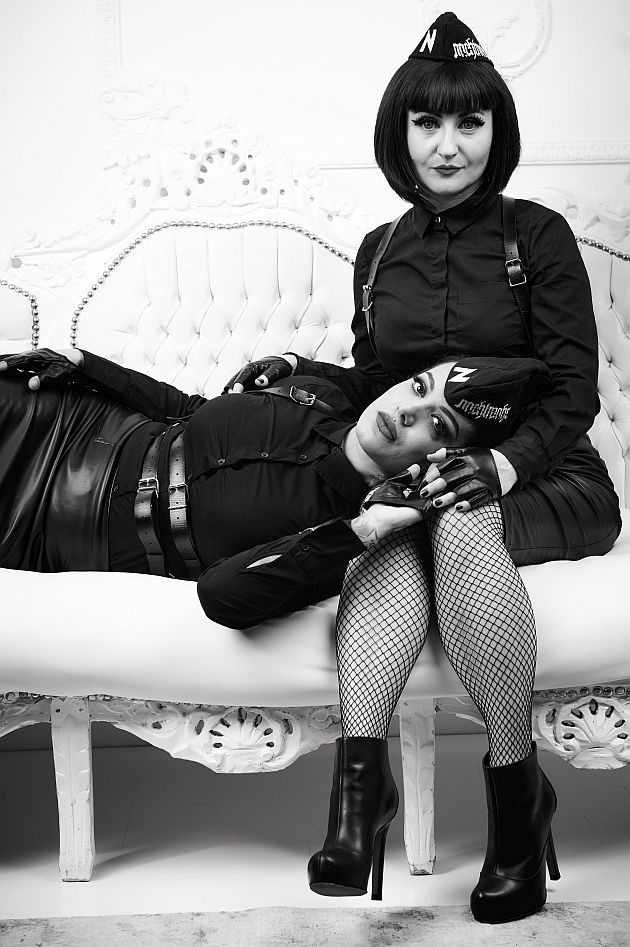
RoD: Looking back at your discography, which album do you feel best represents the essence of NACHTMAHR, and why? Do you have a personal favourite, or one that holds special significance to you?
Thomas: I think ‘Alle Lust will Ewigkeit’ is still the most iconic album of the early days of the band because it shaped the sound for the albums to come, and the new one ‘Verboten!’ will bear the same significance as it finishes the evolution to a more mature and less playful sound.
RoD: How do you hope NACHTMAHR will be remembered in the Industrial and Electronic music scenes? Do you think the controversies surrounding your work will overshadow the music, or are they essential to understanding the project?
Thomas: I would want it to be remembered as a project that was brave and bold. That was not afraid to be different and prevailed even against an onslaught of adversity. A band that was blessed with unparalleled support by its fans and created a distinct look in the scene… and of course, that we played the most badass shows ever.
RoD: What’s next for NACHTMAHR? Are there any new directions or themes you’re eager to explore in your upcoming work? How do you see the project evolving in the future?
Thomas: November 1st will see the release of our new album ‘Verboten!’ as well as the start of our tour of the same name. This will herald a new era for the band, and I can’t wait for the day to finally come.
RoD: Thank you very much for your time!
All Pictures by Gili Shani




